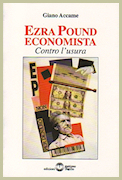soup bowl used by Pound
Winter 2008, Extra Issue 11
Spring 2015, Web Issue 17
Spring 2014, Web Issue 16
Spring 2013, Web Issue 15
Spring 2012, Web Issue 14
Spring 2010, Web Issue 13
Summer 2009, Web Issue 12
Winter 2008, Extra Issue 11
Spring 2008, Web Issue 10
Spring 2007, Web Issue 9
Spring 2006, Web Issue 8
Summer 2004, Web Issue 7
Winter 2004, Web Issue 6
Summer 2003, EXTRA #2
Spring 2002, Web Issue 5
Winter 2001, Web Issue 4
Summer 2000, EXTRA #1
Summer 1999, Web Issue 3
Spring 1998, Web Issue 2
Spring 1997, Web Issue 1
A multidisciplinary
mailbox FLASHLINKS!
Galerie
Paintings & Prints Poetry & Prose Virtual Facsimiles
Founding Editors:
Contributing Editors:
Web Editors:
With usura hath no man a house
of good stone
each block cut smooth and
well fitting
that design might cover
their face,
with usura
hath no man a painted paradise
on his church wall
harpes et luz
or where virgin
receiveth message
and halo projects incision,
with usura
seeth no man Gonzaga
his heirs and his concubines
no picture is made to endure
nor to live with
but it is made to sell
and sell quickly
-Ezra Pound
selection from Canto 45
All essays, poetry, fiction, and artwork are copyrighted in the
Issue Index
Ezra Pound
& Wall Street
i ntro
____________________
from the Boise Weekly:
Tony Evans
Raising Ezra:
Taking another look at Idaho's most
Ezra Pound
reading
Canto XLV [Canto 45] Usura
Ellen Cardona
Pound in Italy, 1924-1939:
The Progression of Pound's Anti-Semitism
and
World War II and Pound, 1940-1945:
The Anti-Semite Revealed
Usura, Canto XLV (Canto 45)
handwritten draft
Mac Oliver
The Savior of New Netherlands
David Hickman:
On Consumption
and
Monolith Commemorating the Failure of the Banks
Allen Ginsberg
War Profit Litany
to ezra pound
Wayne Pounds
"Topaz I manage, and three sorts of blue "
Carlo Parcelli
Without Usura . . .
a selection from:
Deconstructing the Demiurge: Eschatology of Reason:
‘The Gilded Index of Far-Reaching Ruin.’
and
!NO!
Mathematics, Mammon and Art
video from youtube.com
Pound & Pasolini
“Oh, no! Ezra Pound,
crackpot economist, traitor, poet, nut case and anti-Semite held monetary principles more sound than those emanating from Wall Street, Harvard, Wharton, and the University of Chicago combined!? Not only that but the old lunatic, by way of Confucius and Dante, understood human nature better than the legions of free market stooges that infest our political, economic, and educational institutions and the media. Pound simply understood, as opposed to everyone with a 401K, that the world of finance attracts more greedy thieves than a pile of moose dung attracts flies in June.”
This FlashPøint EXTRA! is devoted to Topic #1: the collapsing financial system of the U.S. economy. Old Ez prophesied it 70 years ago. More to the point, he prophesied in poetry; even more to the point, denounced any contemporary poetry or art that failed to address economics and its various impacts on civilization.
The easy reason over the years for sneering at Ezra Pound’s economic analyses has been their fatal entanglement with vilification of Jews, on the one hand, and, on the other hand, praise of Mussolini’s Fascism as one creative program to remedy and surmount “usury age old and age thick.”
To disentangle Pound’s ABC’s of economics from these twin briars, Ellen Cardona continues her examination of the development of Pound’s anti-Semitism in “Pound in Italy: 1924-1939” and “World War II and Pound: 1939-1945,” and for the first time in English, Wayne Pounds translates Chapter One, “Art and Usury from Dante to Pound" from Giano Accame's study Ezra Pound Economista . A visit to Pound’s boyhood town of Hailey, Idaho , prompted Tony Evans to focus on the local origins of both the “stupid suburban anti-Semitic prejudice” (as late in life Pound disowned it) and the Populist view of monetary policy deeply rooted in that silver mining town.
“Ezra Pound & Wall Street” highlights “Canto XLV,” the Usura Canto: in particular, Brendon Keresey’s hypertext rendering, complete with links to commentaries on its references. But Pound himself voices the Canto on the Caedmon recording incorporated above on this page. (The YouTube link preserves a reading to Pound by Pier Paolo Pasolini.) And a page from the handwritten original is also here.
Rosalie Gancie has assembled a selection of Poundian artwork and memorabilia from different periods of the poet's life.
Carlo Parcelli offers his own update of “Canto XLV,” “Without Usura,” as well as the essay “!NO!: Mathematics, Mammon, and Art” whose opening paragraph introduces this Intro.
David Hickman and Mac Oliver deliver responses to Wall Street crisis of their own: Hickman with a cri de coeur in both lyric (“On Consumption” ) and graphic (“Monolith Commemorating the Failure of the Banks” ); and Oliver with “The Savior of New Netherlands,” a verse narrative harrowing of the underground of the World Financial Center, very much in the Pound-Olson tradition of the epic – “poetry including history” – that like Dante, Virgil, and Homer confronts the ghosts of ancestors for illumination and instruction on where to go from here.
One curious irony about the renewed relevance of Pound’s warnings, long and universally dismissed, is that in the wake of the economic devastations that continue to devastate the globe this fall of 2008, they remain fresh: indeed, NEWS that STAYS NEWS!
Tell us what you think!










